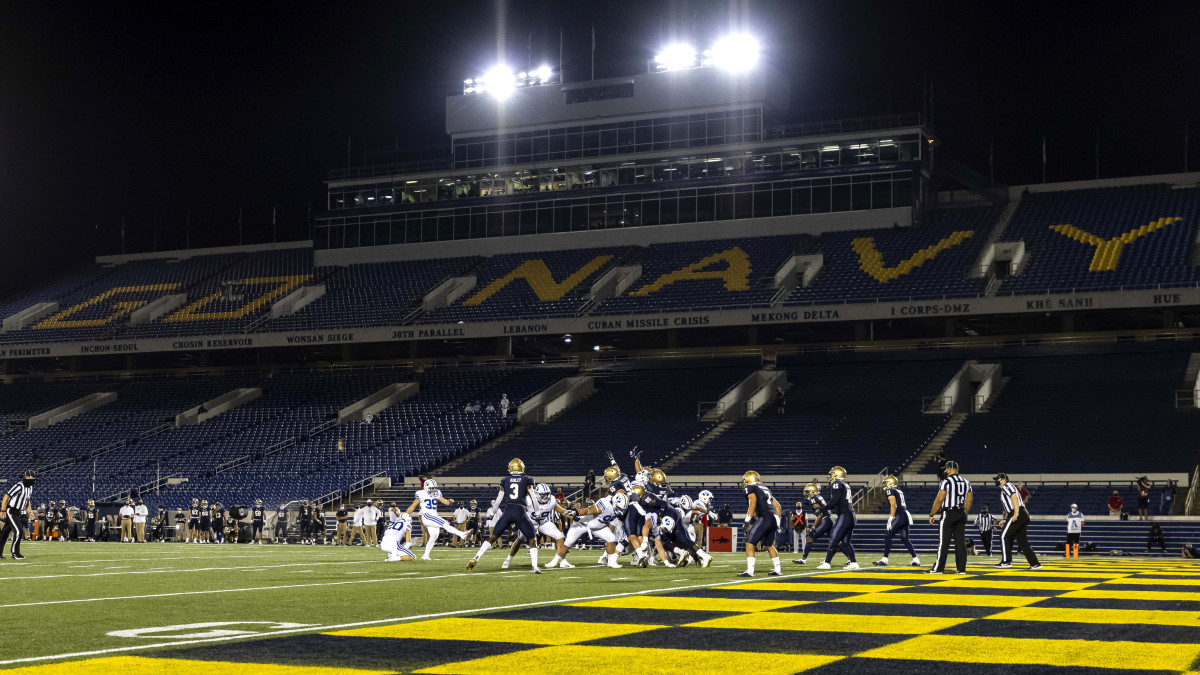Wacky and Weird: The Surreal Atmosphere of BYU's Crushing Win in Navy's Empty Stadium
ANNAPOLIS, Maryland — On the opening snap of its 2020 season, a Navy quarterback aligned in a formation synonymous with the triple option, called for the snap and then handed the rock to a running back on a dive play.
It was one of the rare normal happenings in a somewhat historic event Monday night at Navy-Marine Corps Memorial Stadium, where what unfolded in eastern Maryland was among the most bizarre: a college football game without fans.
In the headliner of college football’s official opening week, BYU crushed the Midshipmen 55-3, kicking off to a national audience what’s shaping up to be the most peculiar college season in decades. Sure, the Labor Day night showcase—a college football tradition televised nationally on ESPN—was a dud. But that was far from the main story of this affair. While some programs are having limited attendance, the Naval Academy is having none, by virtue of Maryland state regulations. It made for an odd three-hour, 15-minute event.

It was quiet—eerily quiet, the only real sounds coming from those electronic whistles, player and coaches screaming and a jumbotron blaring new-aged music such as… "Return of the Mack."
But really, it was weird, even weirder than our trip to Hattiesburg, Miss. last Thursday, when we witnessed in person the season’s first game featuring two FBS programs. South Alabama’s win over home-standing Southern Miss unfolded in a stadium in which only 25% capacity was allowed. Monday’s game featured 0%.
In fact, the stands were basically relegated to TV production crews and camera workers, set up in non-traditional locations because of the attendance situation. Even the press box was pandemic proof. Media members were not allowed to leave the box, isolated in an irritating, but understandable, way. Navy is taking all precautions. A gloved worker was the only person allowed to open a drink cooler toward the back of the press box. She was assigned to retrieve bottles of water and sodas at media members’ requests.
Navy’s cautious approach filtered to the field. Instead of featuring the customary bench seating on its sideline, Navy players sat in metal chairs spaced out from one another. The BYU sideline included the normal bench seating. The Midshipmen held a different kind of preseason camp than BYU, too, something that became a focal point to explain Navy’s lackluster performance. The Mids held limited face-to-face contact during practices to potentially limit COVID-19 spread. In his postgame news conference, Navy coach Ken Niumatalolo blamed himself for his team’s approach during camp, which he said resulted in the dismal showing. Instead of tackling or blocking one another, the Mids tackled and blocked dummies. There were no live scrimmages.
The Navy staff’s pregame concerns materialized quickly. BYU scored on five of its six first-half possessions, mounting what was Navy’s biggest halftime deficit (31–0) since 2002.
“That’s the worst Navy game we’ve ever played. That’s my fault. I chose to block bags and tackle donuts,” said Niumatalolo, who said he will re-evaluate his team’s conservative practicing model with physicians. “You hope it doesn’t turn out that way and we talked in a lot of staff meetings, ‘Are we going to be ready?’ I heard [the staff] and their legitimate concerns. Last time we tackled anybody was the bowl game. Nine months ago.”
Meanwhile, the stadium jumbotron features remained roughly the same—minus, of course, for crowd shots. The Naval ship horn, played as a defensive rallying cry, still boomed from the speakers. Music jammed during TV commercial breaks and we even had a national anthem. The Naval Academy Glee Club belted notes in a video shown on the big screen to, mind you, a nearly empty stadium and sidelines. In college football, teams traditionally remain in the locker room for the anthem.
ESPN conducted its on-field interviews in a socially distanced way, too. The TV crew attached a mic to the end of a boom stick, holding it in front of the face of BYU coach Kalani Sitake during a halftime chat while a reporter asked questions from a few feet away.
It was all downright weird and wacky—just like 2020 itself.
But there were a couple of firsts overshadowed by the surroundings. Navy hadn’t hosted a night game since 2005, and Monday’s matchup marked the first between college teams led by Polynesian head coaches. Niumatalolo and Sitake are, in fact, from the same Hawaiian hometown of Laie.
The latter got the best of the former—in fairly convincing fashion, too. "I can't wait to watch this film," Sitake said.
The Cougars didn’t even need their star quarterback, Zach Wilson, for the romping win. BYU had nearly 200 yards rushing by halftime, finished with 301 and had three tailbacks with at least 50 yards. BYU’s offensive line created such large holes that Navy defensive linemen had no choice but to socially distance themselves from any ball carrier (even during a pandemic, we have jokes!).
But in all seriousness, the fact this game kicked off felt like a minor miracle in itself. Four of the 10 FBS conferences have punted on fall ball and at least six season openers have already been postponed because of COVID-related issues. Heck, BYU is the lone team west of the Rocky Mountains to be playing football in the fall. Only able to retain two of their original 12 opponents, the Cougars had to completely reconfigure their schedule.
BYU’s previously scheduled opener was against Utah, and Navy was supposed to kick off the season against Notre Dame. But here they were, two teams separated by 2,100 miles colliding before fan-less stands just 31 days after scheduling the game.
It ended in fitting fashion, too. Each team gathered together and stood at attention facing a sea of empty blue chairback seats as the Naval alma mater played over the jumbotron.
Welcome to college football in 2020!
